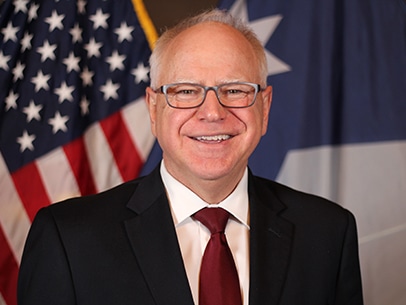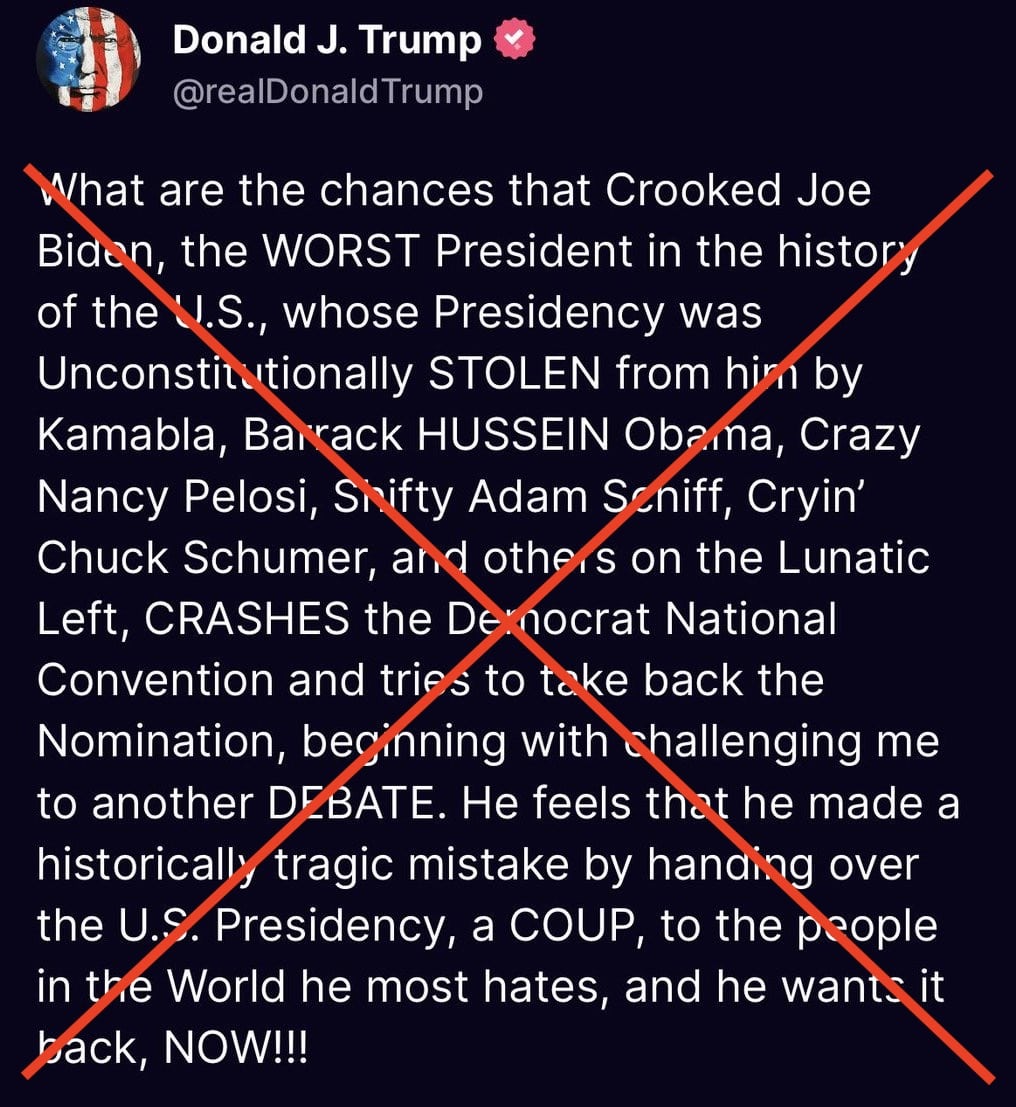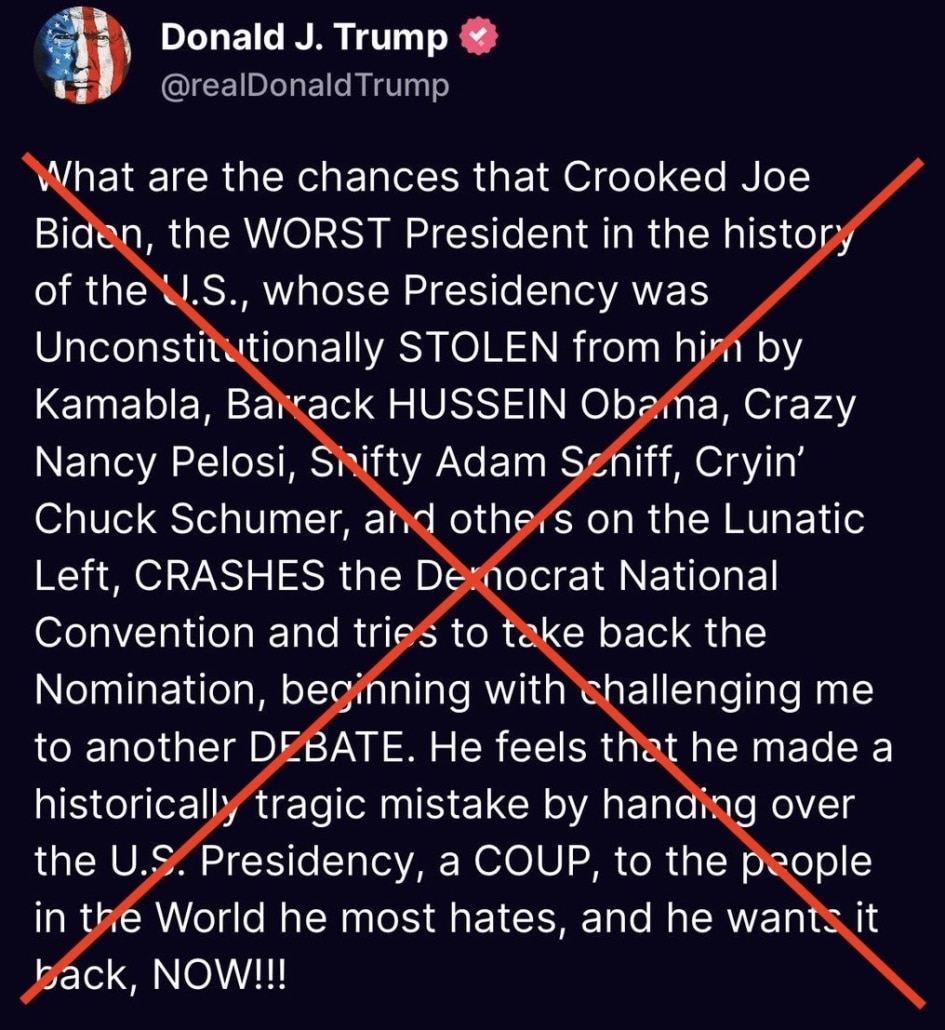Posts
Walz’ Leadership and JD’s Spin: The Ethics of Service
/46 Comments/in 2024 Presidential Election, emptywheel /by emptywheelJD Vance yesterday made the substance of his and Tim Walz’ military service an issue yesterday. This was a guy who specialized in spinning the Iraq War, attacking the service of a guy who was promoted into leadership ranks as a Non-Commissioned Officer over the course of 24 years.
At a campaign stop in Michigan, JD accused that, “when Tim Walz was asked by his country to go to Iraq, you know what he did? He dropped out of the Army and allowed his unit to go without him.”
Thus began the Swiftboating of Tim Walz, led by Chris LaCivita, the mastermind of the original smear campaign against John Kerry.
The substance of the smear campaign that ensued actually pivots on disputed details far less significant than the kinds of lies that JD and his boss tell as easily as they breathe.
The first issue pertains to how to describe Walz’ final rank when he was promoted to Command Sergeant Major, but never finished the relevant training before he retired in 2005, and so was reverted to his prior rank. The second has to do with a single reference to carrying a gun at war, a rhetorical move to support an argument about the proper role for guns. Both of these are arguments about one or two references years ago — the kinds of misstatements that JD and Trump peddle routinely, including JD’s implication that Walz retired solely to get out of deploying to Iraq.
The third issue — the main one — pertains to whether Walz abandoned his men by retiring the year before his unit deployed to Iraq.
By all accounts, however, Walz had retired already before the formal deployment order came in; he retired because he had already committed to run for Congress when the possibility of a deployment came up.
Walz filed paperwork with the Federal Election Commission as a candidate for Congress on February 10, 2005. The next month, after the guard announced a possible deployment to Iraq within two years, Walz’s campaign issued a statement saying he intended to stay in the race.
“I do not yet know if my artillery unit will be part of this mobilization and I am unable to comment further on specifics of the deployment,” Walz said in the March 2005 campaign release.
“As Command Sergeant Major I have a responsibility not only to ready my battalion for Iraq, but also to serve if called on. I am dedicated to serving my country to the best of my ability, whether that is in Washington DC or in Iraq,” he continued, adding: “I don’t want to speculate on what shape my campaign will take if I am deployed, but I have no plans to drop out of the race. I am fortunate to have a strong group of enthusiastic supporters and a very dedicated and intelligent wife. Both will be a major part of my campaign, whether I am in Minnesota or Iraq.”
Walz retired from the Army National Guard in May 2005, according to the Minnesota National Guard. In a 2009 interview for the Library of Congress, Walz said he left the guard to focus full time on running for Congress, citing concerns about trying to serve at the same time and the Hatch Act, which limits political activities for federal employees.
Once you understand that you’d need a time machine for the literal words of JD’s attack to be true, then it changes the discussion, to one about Walz’ ethical decision about the best way to serve his country.
A story on his retirement from the first time he ran describes that he struggled with the ethics of the decision.
Bonnifield said they also bonded during a deployment to Italy connected to post-Sept. 11 Operation Enduring Freedom. After seven months abroad, the unit returned to Minnesota.
But Walz had already begun thinking about an exit and bounced it off others, including Bonnifield.
“Would the soldier look down on him because he didn’t go with us? Would the common soldier say, ‘Hey, he didn’t go with us, he’s trying to skip out on a deployment?’ And he wasn’t,” Bonnifield said. “He talked with us for quite a while on that subject. He weighed that decision to run for Congress very heavy. He loved the military, he loved the guard, he loved the soldiers he worked with.”
Walz said it was merely time to leave and he saw a chance to make a difference in the public policy arena.
“Once you’re in, it’s hard to retire. Of my 40 years or 41 years, I had been in the military 24 of them. It was just what you did,” he said. “So that transition period was just a challenge.”
Bonnifield and his brother did deploy to Iraq, in different units. And they both dealt with severe mental health issues upon their return. Bonnifield said Walz the congressman worked to connect struggling Guard members with help and sought to cut red tape.
“If you listen to him, he’s got a very loud, strong voice,” Bonnifield said. “But there’s a very caring person inside. And one very good leader, too.”
Walz saw a chance to make a difference in the public policy arena. And when elected to Congress as an anti-war Democrat, he spent the twelve years he was there trying to end the Iraq War, and when that failed, trying to make the lives of service members better, both before and after service.
As a member of Congress, Walz opposed President George W. Bush’s troop surge in Iraq, though he still voted to continue military funding to the wars in Iraq and Afghanistan. He was an early advocate for repealing the military’s “don’t ask, don’t tell” policy barring servicemembers from serving if they came out as members of the LGBTQ+ community.
Walz joined with Republicans in 2016 to oppose cuts to the Army’s troop levels meant to save money — a trend that continues today. He argued doing so would leave the service without the manpower to meet growing worldwide threats. As a Guard veteran and co-chair of the House National Guard and Reserve caucus, Walz advocated for the part-time force, arguing Pentagon strategies and plans should better integrate the Guard and Reserves to make use of scarce Army resources.
Walz’s likely biggest legislative achievement in Congress, however, was clearing bipartisan veterans’ suicide prevention legislation that became law in 2015.
This included opposition to some of Trump’s efforts to bring grift to Veterans Affairs.
As the top Democrat on the committee, Walz was a chief adversary for the Trump administration’s Department of Veterans Affairs. He battled with then-acting VA Secretary Peter O’Rourke in 2018 during a standoff over O’Rourke’s handling of the inspector general’s office, and pushed for an investigation into the influence of a trio of informal VA advisers who were members of Trump’s Mar-a-Lago club. An investigation by House Democrats completed after Walz left Congress concluded that the so-called Mar-a-Lago trio “violated the law and sought to exert improper influence over government officials to further their own personal interests.”
Walz also opposed the Mission Act, the bill that expanded veterans’ access to VA-funded care by non-VA doctors that Trump considers one of his signature achievements. Walz said in statements at the time that, while he agreed the program for veterans to seek outside care needed to be fixed, he believed the Mission Act did not have sustainable funding. VA officials in recent years have said community care costs have ballooned following the Mission Act.
That’s where a sound comparison should focus, in my opinion.
JD only got to Congress, of course, after being recruited by Peter Thiel, after selling out his childhood for fame, after becoming a hedgie — which background got him a seat on the Banking Committee, not the Veterans Affairs Committee. But once JD got to the Senate, he has garnered attention as a member of a later generation of veterans, this time deemed not anti-war, but America First, an anti-interventionist stance conducive to far-right politics.
On April 23, just hours after the United States Senate approved $61 billion in new military aid to Ukraine, Ohio Sen. J.D. Vance took to the floor of the Senate to offer a sweeping rebuke of his colleagues’ decision. Standing behind his desk, Vance — who has emerged as a leading critic of U.S. policy toward Ukraine — unspooled a laundry list of objections: that American military capability is spread too thin; that Ukraine is outmanned and outgunned regardless of an increased level of U.S. support; that the Biden administration lacks a clear plan for bringing the war to a close.
Partway through his remarks, Vance suddenly got personal and pivoted to a less frequently discussed source of his skepticism: his time serving as a Marine during the Iraq War.
“In 2003, I made the mistake of supporting the Iraq War, [but] a couple months later, I also enlisted in the United States Marine Corps,” said Vance, who deployed to Iraq in 2005 as a corporal with the public affairs section of the 2nd Marine Aircraft Wing. Vance’s tenure in the military features prominently in his 2016 memoir “Hillbilly Elegy,” in which he recounted how his time in the Marines helped him overcome his troubled upbringing in post-industrial Ohio to become a disciplined and functional adult. But on the Senate floor, his account of his military service was notably less sanguine.
“I served my country honorably, and I saw when I went to Iraq that I had been lied to,” Vance recounted, the emotion rising in his voice. “[I saw] that promises of the foreign policy establishment of this country were a complete joke.”
[snip]
In Ukraine, Vance argued, the U.S. is doing the opposite: By funding Ukraine and “subsidizing the Europeans to do nothing,” the U.S. is setting itself on a path toward greater involvement in the region, not trying to further extricate itself.
Regardless of the accuracy or intellectual consistency of Vance’s argument, the tendency that it reflects — to ground U.S. foreign policy in a narrower definition of U.S. interests — bears the mark of the failures of the previous wars.
“This idea that it’s in our distinct interest to spread democracy all over the world,” Vance said. “I don’t think that holds even a little bit of water.”
Vance’s opposition to support for Ukraine, in support of which the trained propagandist adopts Russian propaganda, is one of the things that made Trump a fan. And it led him to vote against funding for the military — something that the anti-war Walz did not do.
Vance the propagandist has made the military service of both his and Walz, the NCO, a campaign issue.
But the logical place to bring that scrutiny is not to LaCivita’s parsing of words Walz uttered years ago, but to the ethical decisions both made when they came to an anti-war stance, to the notion of service each took away, to their success at fulfilling that ethic of service.
Republicans Mourn Another Failed Attempt to Create a Democratic Schism
/96 Comments/in 2024 Presidential Election /by emptywheelKamala Harris and Tim Walz both gave great speeches last night.
But I was more interested in the dynamics surrounding Josh Shapiro’s appearance. As a number of people acknowledged, Philly’s notoriously rambunctious crowds had the potential to express dissatisfaction that their beloved Governor wasn’t chosen.
It created the same kind of delicate situation that Kamala navigated when she fully supported Biden through the period he was contemplating dropping, only to focus on the debt she owed him in the first several appearances she made after she assumed the mantle of candidate.
Indeed, Walz even paid tribute to Shapiro in some of his first comments.
My god, what a treasure you have in Josh Shapiro. Holy Hell can this guy bring the fire. He can bring the fire. This is a visionary leader. Also I can tell you: everybody in America knows, when you need a bridge fixed, call that guy. And I think sometimes we forget, and you see people a little one dimensional, but seeing a guy who cares so deeply about his family, a man with compassion, vision, and I have to tell you this, I know this from experience: there is no one you would rather to go a Springsteen concert with than him. Than that guy.
Remember: Trump recently said he doesn’t like Springsteen because Springsteen doesn’t like him…
As it happened, the excitement of the Walz pick led at least CSPAN to expand their coverage of the rally to pick up the earlier speakers, giving Bob Casey some earned media. And that, of course, included Governor Shapiro’s speech, which substantially served as tribute to Shapiro’s mutual love affair with Philadelphia, complete with its role in founding the freedom of the United States.
In the wake of last night’s rally, there are several stories out (one, two) claiming — dubiously — that some of the divisive hits on Shapiro leading up to Saturday’s pick weren’t an effort to renew the same schism around Israel that had undercut Biden’s support since last October, but were instead a jujitsu effort to persuade Vice President Harris not to pick Pennsylvania’s popular governor.
Trump, though, has already ruined the efforts to retroactively claim credit for Kamala’s pick, admitting on Fox that he was “absolutely surprised” that Kamala didn’t pick Shapiro. They laid all that dirt because by their logic, Shapiro was the only choice.
As he had been counting on Joe Biden as his opponent (and seems to still be hoping that comes back), Trump had been counting on Shapiro being the VP candidate, even while still mobilizing his antisemitic slur against Adam Schiff.
Republicans were left flat-footed again, claiming they want to run on Walz’ failures to stop violence after the George Floyd protests, without thinking through what it would mean to run on inaction in the face of violent assaults. Even during the George Floyd protests, Trump was hiding in the White House bunker, and he watched in glee as his mob attacked the Capitol on January 6.
Republican trolls were left meming the free tampons Walz made available in schools, without thinking that the same logic behind giving free breakfast and lunch to any kid who wants it — eliminating one of the barriers to get kids present in school and learning — lies behind making period products available for free, too.
So they reverted to their attempts to sow division.
One after another Republican tried to wrench some animosity out of the Walz pick by claiming that Democrats won’t pick Jews in prominent positions. Which led some prominent Jews to express confusion.
Yet there has been little comment about what Shapiro himself said about his faith.
Josh Shapiro mobilized a lot of Philadelphia’s own imagery of Liberty in his speech last night, surely one drafted in part thinking it would be an acceptance speech.
But he ended by invoking his faith.
I wanna just say this. I lean on my family and I lean on my faith, which calls me to serve. And I am proud of my faith. Now hear me. I’m not here to preach at y’all but I want to tell you what my faith teaches me. My faith teaches me that no one — no one — is required to complete the task but neither are we free to refrain from it. That means, that means, that each of us has a responsibility to get off the sidelines, to get in the game, and to do our part. Are you ready to do your part? Are you ready to form a more perfect union? Are you ready to build an America where no matter what you look like, where you come from, who you love or who you pray to, that this will be a place for you. And are you ready to look the next President of the United States in the eye and say, “Hello, Madam President”?
Josh Shapiro used his faith as a way to call thousands of ardent supporters to put in the work to make Kamala Harris, Madam President. Josh Shapiro used his Jewish faith to promise a more perfect union.
Republicans were hoping to use Shapiro — whether he was selected or not — as a way to recreate divisions in the Democratic party. And that plan to divide first — to run on sowing divisions in America — left them flat-footed and unprepared, once again.
Update: Fixed my misspelling of The Boss’ name.
Harris-Walz: The First Rally
/80 Comments/in 2024 Presidential Election /by Rayne[NB: check the byline, thanks. /~Rayne]
The last thread is getting unwieldy and there’s a lot to discuss after tonight’s first rally in Philadelphia.
Here’s the video if you didn’t get to watch it:
I think this one might be my favorite so far:

Heh. Share a link to your favorites in thread below.
WalzPilled
/213 Comments/in 2024 Presidential Election /by emptywheelAccording to multiple outlets and flight records, the Vice President has picked Tim Walz as her running mate.
Which means we’re in for some awesome Midwest wholesome fun.
Chatter away.
Update: Here’s the campaign press release.
Today, Vice President Kamala Harris announced her selection of Minnesota Governor Tim Walz as her running mate in the 2024 presidential election. Together, Vice President Harris and Governor Walz will fight for a future that strengthens our democracy, protects reproductive freedom, and ensures every person has the opportunity to not just get by, but to get ahead.
Vice President Harris and Governor Walz have spent their careers fighting for working families across the country. As a prosecutor, attorney general, senator, and vice president, Vice President Harris has taken on the big banks, led the fight for reproductive freedom, and stood with our allies against Putin’s aggression. Governor Walz is a champion for working families, a retired Army National Guardsman, a former high school teacher and football coach, Member of Congress, and two term governor where he cut taxes for working families, lowered the cost of insulin, and protected women’s right to choose.
Vice President Harris wrote: “I am proud to announce that I’ve asked Governor Tim Walz to be my running mate. One of the things that stood out to me about Tim is how his convictions on fighting for middle class families run deep. It’s personal. As a governor, a coach, a teacher, and a veteran, he’s delivered for working families like his own. We are going to build a great partnership. We start out as underdogs but I believe together, we can win this election.”
Later today, Vice President Harris and Governor Walz will make their first joint campaign appearance at a rally with thousands of supporters in Philadelphia, Pennsylvania. This event is the first of a five-day barnstorm to introduce the Harris-Walz ticket to voters in key battleground states.
From now until Election Day, Vice President Harris and Governor Walz will continue to crisscross the country to outline the choice between two very different visions for the future: Vice President Harris and Governor Walz, who are running to move the country forward, not backward — or Donald Trump and JD Vance, who are running to enact their extreme and dangerous Project 2025 agenda that will roll back Americans’ rights and freedoms, hurt the middle class, and threaten our democracy.
Governor Tim Walz
Governor Walz is a champion for America’s working families. He enlisted in the Army National Guard, rising to the rank of Command Sergeant Major. After attending college thanks to the GI Bill, Tim Walz served his community as a high school teacher and football coach – taking his team to the state championship for the first time in the school’s history. He became a member of Congress in a Republican district by representing the needs of farmers and rural America. Governor Walz has done more to help middle class families get ahead than any other statewide leader in recent memory. That experience makes him the ideal running mate for Kamala Harris, who has taken on the big banks, led the fight for reproductive freedom, and stood with our allies against Putin’s aggression during her time as a prosecutor, Attorney General, Senator, and Vice President.
As governor, Walz lowered the cost of insulin to $35 per month for many Minnesotans. He eliminated junk fees. And, he signed paid leave into law so that parents can take care of sick family without losing their job. Governor Walz stood up for fundamental freedoms and made Minnesota the first state to pass a law codifying abortion rights after the Supreme Court overturned Roe. He funded Minnesota police departments, putting more cops on the street and investing in body cameras, and established universal background checks for gun purchases. And, he worked across the aisle to pass a bipartisan infrastructure package.
A lifelong Midwesterner, Governor Walz grew up working on his family farm. He enlisted in the Army National Guard when he turned 17, following in his father’s – a veteran’s – footsteps. During his 24 years of National Guard service, he specialized in heavy artillery and retired as the highest-ranking enlisted National Guard soldier in southern Minnesota.
Governor Walz is a gun owner, avid pheasant hunter, and supporter of the Second Amendment – and he, like millions of gun owners, believes that Congress must do more to tackle gun violence in our communities. As governor, he established universal background checks for gun purchases.
For six terms, Governor Walz represented Minnesota’s First Congressional District – a conservative-leaning district where he was only the second Democrat elected since 1890. The son of an Army veteran and a retired Army National Guard member himself, Walz was the ranking member on the House Veterans Affairs Committee, where he passed legislation to help stem veterans’ suicides.
Governor Walz met his wife Gwen teaching high school in Nebraska before moving to Gwen’s home state of Minnesota. A former union member, Tim taught high school for two decades.
Governor Walz and Mrs. Walz have two children, Hope and Gus. Governor Walz and Mrs. Walz struggled with years of fertility challenges and had their daughter, Hope, through reproductive health care like IVF – further cementing his commitment to ensuring all Americans have access to this care.






